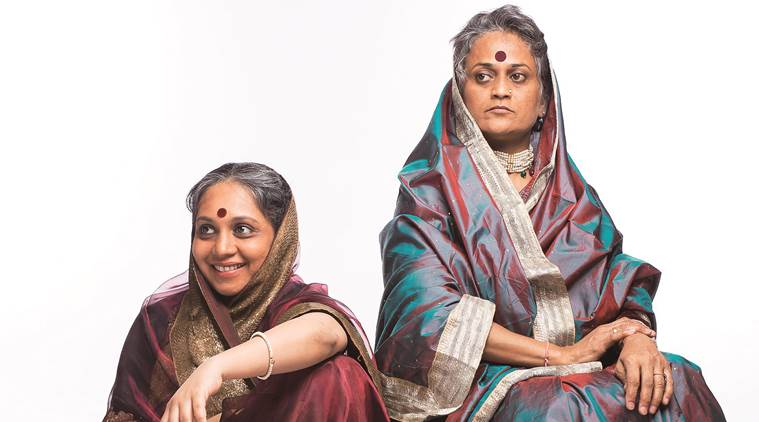‘There was etiquette even in rivalry’
Purva Naresh seeks to bring alive two musical traditions — nautanki theatre and baithak singing — through her new play, Bandish 20-20000Hz.
 Actors from the play
Actors from the play
Through the dirt tracks of villages came the audiences for one singer; to the creamy layer belonged the patrons of the other. The former, a nautanki performer, could be heard for miles around, holding a note steady at a single pitch. The latter, a classical singer, famous for her baithaks, was a master of nuance. She would set off on journeys through a plethora of ragas, creating bridges to layers and meanings. Their heyday is over and the two meet in a green room in Purva Naresh’s play, Bandish 20-20000Hz. Naresh, a dancer, pakhawaj player, playwright, director and actor, sets the stage to explore the histories of two cultural genres, folk theatre and classical music, through real and fictional experiences. Two of her earlier plays, Afsaneh: Bai Se Bioscope Tak and Aaj Rang Hai, have been themed around music, and she questioned the nature and structure of the classical idiom in Ladies Sangeet at the Aadyam theatre festival last year. Bandish will open Aadyam 2017 in Delhi. An interview with Naresh:
What do the two ageing artists talk about in the green room? They talk of escaping from kings’ palaces, slapping British officers, getting kidnapped by the local rangeeley zamindars, refuting lovelorn nawabs and getting duped by charming and conniving men in the name of love and marriage. The baithak singer claims a higher stance, musically, but the nautanki artist is not willing to relinquish easily. They belong to a generation when dushmani bhi tameez se nibhayi jaati thi (there was etiquette even in rivalry).
How do Beni and Munnu, two protagonists from your previous plays, become a part of the storyline?
When I began to write a play on music, Beni and Munnu walked into the pages and demanded their place. I said ok. Both are based on characters I have known in real life (Beni Bai was her grandmother, a baithak singer of the erstwhile principalities). Munnu is a wonderful character in the lives of women musicians, he is a wise fool and Man Friday. Danish Hussain plays him with innate charm. The play is set in today and when the four artists come together in the green room, kahaniya chalti rahti hai (the stories would go on). The stories don’t vanish in the air, they change the energy and the anecdotes are performed through music, dance and even a recital of the hilarious Manglacharan, which was written in English during the colonial rule as a tribute to Queen Elizabeth.
Growing up in Uttar Pradesh, did you watch a lot of nautanki performances?
If I look at nautanki, I see a dying art. It won’t hold urban audiences with its dialogue baazi as it needs patience with language. They would talk for long to come to the point. I feel that films became a shorter form of nautanki. Pure nautanki has a lot of energy, the actors come singing, there are dances and a lot of dialogue baazi. What really tickled me were the nautanki Kanpur and Hathras booklets (there are two schools of nautanki —in Hathras and in Kanpur in UP) that were like pulp fiction. When I read about Harishchandra and Sultana Daaku, I thought that nautanki isn’t only a musical performance, it is also popular literature.
You were born into a world of classical music. What were your experiences with baithaks?
Today, baithaks are about food and music but, in the past, music was the food. It was held in musicians’ houses and was strictly by invite. I find that very elitist. Why should music only be for people who are invited? Baithaks were tied up in etiquette and adab-kayda. You cannot say wah wah to appreciate a senior; because it would mean that you are arrogant; you had to keep your head lowered while listening or you would get an angry look from a senior; even looking distracted was an offence. We were junior, learners and young, and the next generation is so much more irreverent than the one before. I have an intellectual issue with the classical arts because they were not democratic.
The play has music, movement, text, and has to stay true to the world. Is it a struggle to keep the balance?
The balance is always shifting. How much nostalgia can take over text, is a constant question. I am a puppeteer pulling the strings of many realms of experience.
Bandish 20-20000Hz will be staged at Kamani auditorium on May 27 and 28





- 01
- 02
- 03
- 04
- 05























